The Failure of Target's Audit System in its Chinese Supplier Factories
Table of Contents
I. Background
In August 2011, China Labor Watch (CLW) investigated the labor conditions of Rushan Alice Garments Company, Ltd. (Alice) in Weihai, Shandong Province by conducting interviews and an on-site investigation. To collect information, a CLW volunteer worked in the factory for more than a month. Rushan Alice is one supplier of the Target Corporation (Target). In the investigation, CLW uncovered various violations of both the Chinese labor laws and regulations and Target’s Standards of Vendor Engagement. After the investigation, CLW drafted a report on the results of our discoveries.
On August 29, 2011, CLW sent an email, disclosing our investigatory report, to the Target Corporation. CLW hoped that Target would re-audit the factory and urge it to improve its labor conditions. In the email, CLW informed Target that it would release the report after 10 days if there is no response. Target replied to the email immediately and promised that it would re-investigate Rushan Alice and provide CLW with their findings.
On September 15, 2011, CLW received feedback from Target. In the email, Target denied that CLW ever investigated Rushan Alice and insisted that the labor conditions outlined in CLW’s report were not from the Rushan Alice factory, but from a factory called Aolidan Company. Target denied having any connection to the Aolidan factory. Furthermore, Target denied the investigation results of Rushan Alice and steadfastly stated that the labor conditions in the factory generally complied with the Chinese labor laws and regulations and Target’s Standards of Vendor Engagement.
China Labor Watch and its investigators have a long history of conducting fair and trustworthy factory investigations in China. Past auditing experiences prove that the investigations have come from first-hand experience in the factory, and are thus truthful and reliable. On the contrary, the information obtained by the international companies from its supplier factory management is often one-sided and inaccurate because of the huge stake involved.
Because there is a great divergence on the basic facts of the investigation report between Target and China Labor Watch, CLW hereby publishes this report on Rushan Alice’s working conditions, including evidentiary photos and Target’s own investigation results. CLW also urges that Target actively work together with the Rushan Alice factory to advance its labor conditions in order to effectively protect the rights of its workers.
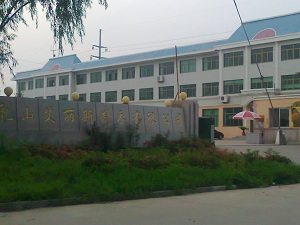
The front gate of Rushan Alice Garments Company, Ltd.
Investigatory Report
-
The factory is reluctant to hire workers from outside the area because it worries that they will not stay for very long.
-
The company does not administer a physical examination before beginning work.
-
The factory does not provide any form of employee training or orientation.
-
Teenage workers labor under the same conditions as regular adult workers.
-
Workers are not provided with a duplicate copy of the labor contract for their own records.
-
Workers are required only to sign their name to make the contract binding. They are not provided with any explanation in regard to its content or given the opportunity to more closely examine the contract.
-
The factory currently runs on a 10 hours per day, 28 days per month work schedule. When the factory receives multiple production orders, workers are often required to work 30 days per month without any days off.
-
The factory does not provide workers with a wage slip explaining salary calculations.
-
Workers’ salaries are calculated according to a piece-rate wage system. Workers receive no overtime wages.
-
No matter if a worker takes sick, maternity, or vacation leave, there is no pay.
-
The factory does not provide workers with the option of purchasing any sort of insurance or social security plan.
-
The factory workshops were found to be very messy and in disarray. There are no direct routes to emergency exits or windows and there is no ventilation system.
-
Sewing machines are not routinely inspected for maintenance problems.
-
The emergency first aid kits are usually locked.
-
Workers have never been through any fire drill.
-
The investigator found the “outsource contract” in the factory and eye-witnessed the workers in Alice put labels on the outsourced products and put them into a Target’s box together with the factory’s products.
Investigation Date: August, September 2011
Positions Interviewed: Button maker and hemmer (4 workers), weaving and sewing workshop (3 workers), sweater workshop (4 workers), guard (two workers), and factory director
Number of Factory Workers: Over 100
Number of CLW volunteer working in the factory: 1
Products Manufactured: Bedding, athletic clothing, leisure clothing, and sweaters
Primary Customer: Target
Factory Introduction[1]
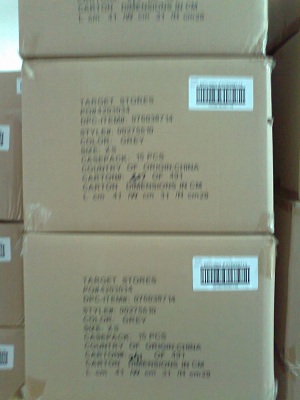
This factory is producing for Target
Rushan Alice Garments Company, Ltd. was founded in Shandong Province in the Shandong peninsula region. The company is an American enterprise that designs, manufactures, and sells clothing. The company uses over 200 advanced machines to produce sweaters and other garments. This year, the company has manufactured over 2 million light sweaters of different types. Alice Garments has exported their products to Korea, America, Europe, and many other countries around the world.
Address: Shandong, Weihai, Rushan City, 38 Industrial Park Road
Zip Code: 264500
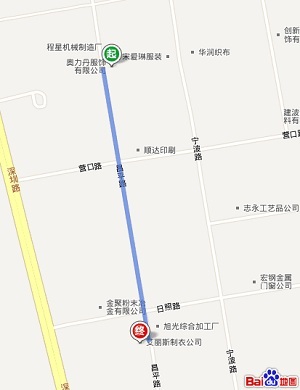
The green mark is Aolidan and the red mark is Rushan Alice.
Recruitment and Resignation
Rushan Alice Garments Co. is currently hiring only skilled workers. They are reluctant to hire workers from outside the area because they worry that it is likely they will not stay for very long. Potential applicants have the opportunity to go through a factory and job introduction before deciding to work at the factory. They also have the additional option of immediately beginning work without any introduction. The only documentation needed to apply for a position is one's personal identification card.
The company does not administer a physical examination before beginning work, and there is no fee one must pay before starting. The factory does not provide any form of employee training or orientation. Potential factory workers can begin work immediately after submitting an application.
CLW investigators had the opportunity to interview two male factory workers whom had recently turned 17 years old. Both workers stated that they choose to begin working in the factory, because they had not graduated from middle school. In the factory workshop, they are responsible for putting buttons onto winter coats. They labor under the same conditions as regular adult workers, forced to repeat the same task for hours. Upon observation, investigators made note of the extreme skill these workers displayed when performing their workshop tasks. They were able to sew four buttons onto a jacket in less than two minutes.
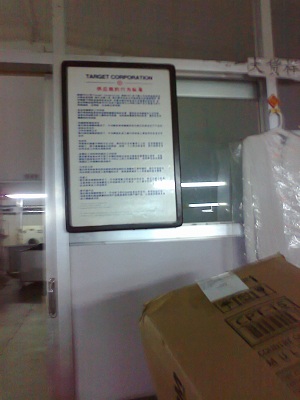
Target's Compliance of Standards of Vendor Engagement
Labor Contract
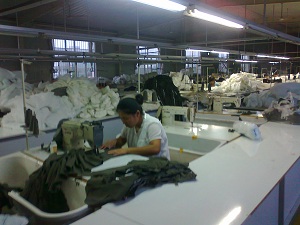
Workers sewing in the factory
Once hired, workers begin working under a three month probationary period. After completing a three month probation period, workers are given the opportunity to sign a one-year labor contract with the factory. Workers are not provided with a duplicate copy of the labor contract for their own records. Interviewed workers told investigators that labor contracts were a simple formality merely for the sake of deceiving factory inspectors and passing factory audits. Workers are required only to sign their name to make the contract binding. They are not provided with any explanation in regard to its content or given the opportunity to more closely examine the contract.
Work Hours
The factory currently runs 10 hours a day, 28 days per month work schedule. When the factory receives multiple production orders, workers are often required to work 30 days per month without any days off.A typical shift runs from 7:10 am until 11:10 am, and continues from 1 pm until 7 pm. The factory does not operate on a double-shift system.
Factory workers must swipe their employee card when beginning and ending a shift. Workers stated that they have daily quotas they are required to meet. There is no fixed daily quota the factory needs to meet, and workers are not sure exactly how much the factory outputs on any given day.
Every workshop is equipped with a wall clock. At the end of a shift, after every production worker sorts out the fabric from the finished clothing, the workers may leave.
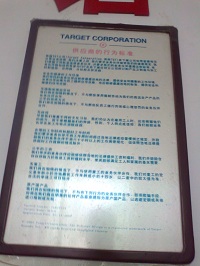
Target's Compliance of Standards of Vendor Engagement
Salary
Workers are paid on the 15th of every month. Workers’ salaries are deposited directly into their bank account. New employees are paid in cash. The factory does not provide workers with a wage slip explaining salary calculations.
Workers’ salaries are calculated according to a piece-rate wage system[2]. Workers receive no overtime wages. Interviewed workers were unsure how much it cost the factory to manufacture one article of clothing. The factory does not publically release this information. Interviewed workers said their salary varies from month to month and, they are not sure as to exactly how much the monthly salary is. When this same question was proposed to the factory director, she said that a worker's monthly salary is around 1,600 RMB. Workers that work very fast can earn between 2,000 and 3,000 RMB per month.
No matter if a worker takes sick, maternity, or vacation leave, there is no pay.The factory also does not provide workers with the option of purchasing any sort of insurance or social security plan. Workers were not sure whether or not they receive paid time-off during national holidays.
Housing and Food
The factory has a cafeteria, but it is just an unfurnished room. According to a factory guard, the cafeteria does not cook food.The factory director said that, although the factory does not provide food, workers are given a 70 RMB monthly food stipend.
The factory provides workers with rent-free dormitory living quarters. Each dormitory room can house between 3 to 5 employees. There is a public bathroom located on the first floor. Workers living in the dormitory are required to pay monthly utility fees.
Occupational Safety and Worker Protection
Interviewed workers were unsure as to whether the factory had an occupational safety committee. The factory workshops were found to be very messy and in disarray. There are no direct routes to emergency exits or windows and there is no ventilation system.
The lighting in the workshops is very dim. Envelopes and phones are placed on top of the sewing machines. Sewing machines are not routinely inspected for maintenance problems.
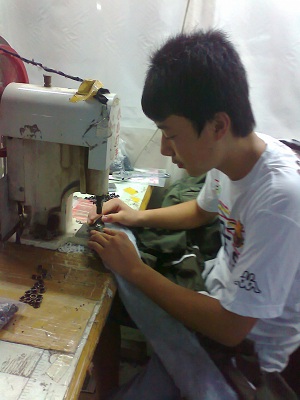
Teenage worker without safety equipment
Manufacturing workshops have emergency first aid kits, but they are usually locked. Workers were not sure whether or not the first aid kits contained any medical supplies.
Fire Safety
Interviewed workers told investigators that they were unsure whether or not the factory had fire drill. The investigators found the factory fire extinguishers look old and broken. On the 10th of every month, the fire extinguishers are inspected, but in reality, it just entails someone signing a sheet of paper next to the extinguisher box.
Other
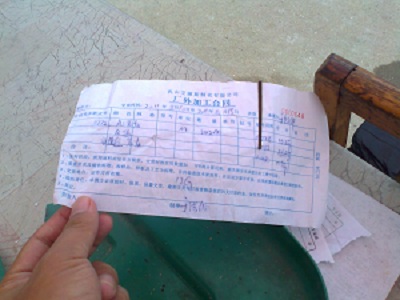
Outsourcing receipt
The factories outsourced some of the order to other factories with inferior labor conditions. Target denied there is any outsource issues in the factory regarding Target’s order. However, the investigator found the “outsource contract” in the factory and eye-witnessed the workers in Alice put labels on the outsourced products and put them into a Target’s box together with the factory’s products.
Interviewed workers were not sure whether the factory had a labor union or labor representatives. Outside of the factory gate, there is a board that says the factory does have a labor union committee.
A majority of the workers at the factory are female and come from Rushan County. Most workers are not familiar with labor rights, and had no knowledge about the specifics of salary, overtime, and the labor contracts.
When asked whether or not he would hire a 14 or 15 year old worker, the factory owner answered, "Hiring child laborers is illegal". But the interviewer prodded further, stating that the child he recommended was a fast and reliable worker, and started working after graduating from elementary school. After long hesitation, the factory supervisor agreed to hire the child to work at the factory. It is clear that as long as a worker is experienced and fast, the factory would be willing to him or her, no matter their age.
Appendix 1: Letter to Target from China Labor Watch
Gregg Steinhafel, CEO
Target Corporation, Target
1000 Nicollet Mall
Minneapolis, MN 55403-2467
Phone: 612-696-6234
Fax: 612-696-6325
Email: Gregg.Steinhafel@target.com
August 30, 2011
Dear Mr. Steinhafel,
After our investigation conducted in Dongguan Fuxiang Garment Factory regarding labor conditions and research on Target's supplier chain, which has previously been discussed with Ms. Susan Hartman,China Labor Watch recently conducted another investigation on the Rushan Alice Garments Company, Ltd. in Weihai, Shandong province. This factory, another one of Target's supplier factories, blatantly infringes upon Chinese labor law and Target's Compliance of Standards of Vendor Engagement.The factory imposes extreme overtime hours on its workers, provides insufficient payment for overtime work, as well as outsources its orders to other factories. The labor conditions in those subcontracted factories are beyond the public's supervision and usually have worse labor conditions than those factories being monitored. Through our recent investigation, we believe this phenomenon is ubiquitous throughout Target's entire supplier chain. Target's complex and obscure supplier chain, which usually includes international trading companies as intermediaries and many levels of contracted supplier factories discourages a public scrutiny posed on the Target OME's labor condition.
In believing Target should be held accountable to reform the above stated situation, I am writing to urge Target to work with Rushan Alice and other similar factories to rectify these violations by demanding them to withdraw its subcontracting orders and put all products sold in Target's retail stores under supervision.
The major violations in Rushan Alice are:
-
The factory reluctant to hire workers from outside Rushan.
-
The company does not administer a physical examination before beginning work.
-
The factory does not provide any form of employee training or orientation.
-
Teenage workers labor under the same conditions as regular adult workers.
-
Workers are not provided with a duplicate copy of the labor contract for their own records.
-
Workers are required only to sign their name to make the contract binding. They are not provided with any explanation in regard to its content or given the opportunity to more closely examine the contract.
-
The factory currently runs on a 10 hours per day, 28 days per month work schedule. When the factory receives multiple production orders, workers are often required to work 30 days per month without any days off.
-
The factory does not provide workers with a wage slip explaining salary calculations.
-
Workers’ salaries are calculated according to a piece-rate wage system. Workers receive no overtime wages.
-
No matter if a worker takes sick, maternity, or vacation leave, there is no pay.
-
The factory also does not provide workers with the option of purchasing any sort of insurance or social security plan.
-
The factory workshops were found to be very messy and in disarray.
-
There are no direct routes to emergency exits or windows and there is no ventilation system.
-
Sewing machines are not routinely inspected for maintenance problems.
-
The emergency first aid kits are usually locked.
-
Investigators discovered a factory labor contract that did not belong to Rushan Alice Garment Co. The contract clearly stated that this factory outsources its order to other factories.
I attached the detailed report of Rushan Alice with this email. This report shall be publicized on China Labor Watch's website within 10 days. I hope Target can conduct an investigation on this factory during the 10 days period so that we can discuss on the base of what initiative Target can take to change the labor condition in Rushan Alice and improve Target's supplier chain. Should you have any further questions or comments, please do not hesitate to get in contact with me.
Best,
Li Qiang
Executive Director
ChinaLabor Watch
Appendix 2: Target’s Reply to China Labor Watch
From: Erin Rath Erin.Rath@target.com
Sent: Thursday, September 15, 2011 05:07 PM
To: xingni@chinalaborwatch.org
Cc: Kay Schultz kay.schultz@target.com
Subject: RE: Report of Rushan Alice
Hi Sidney,
Thank you again for delaying your publication until we had time to conduct our due diligence and investigation of the Rushan Alice factory. Since we last corresponded, Target’s Social Compliance team has conducted an unannounced audit of this facility and engaged in ongoing dialogue with the factory and vendor. The labor conditions outlined in your initial email are not from the Rushan Alice factory, but from a factory called Aolidan Company. Rushan Alice and Aolidan operate on a shared compound, but there is no Target connection to Aolidan.
Regarding the Rushan Alice factory, our audit confirmed that the allegations outlined in your letter are unsubstantiated. Target product is not being outsourced. There are no infractions related to overtime work or insufficient pay. As part of the audit, we conduct interviews with employees and review paperwork for consistency. We confirmed how employees are compensated and there are no outstanding issues. Employees confirmed that they read through the terms of their contracts prior to signing and receive copies of these documents. They also confirmed that the first aid kits are unlocked, fully stocked and that they are able to access them when needed.
We did identify two instances of emergency lighting not being lit in one workshop and the dorm area; however, that was corrected during the audit.
While we are not able to audit the Aolidan factory because it is not one of Target’s vendor factories, we have requested that this separate facility be clearly identified both inside and outside of the facility.
Given this information, please confirm that Target will not be named in your upcoming publication.
Also, we would be happy to facilitate a call with you and Target’s Social Compliance team to share more information with you on how our social compliance works and how we hold vendors accountable to abiding by our Standards of Vendor Engagement. We believe this information could be very useful to you and further an open dialogue with you about your concerns and processes for identifying Target-registered factories. Please let me know if you are interested in arranging a call to discuss further.
Regards,
Erin
Appendix 3: Photos Taken in the Factory
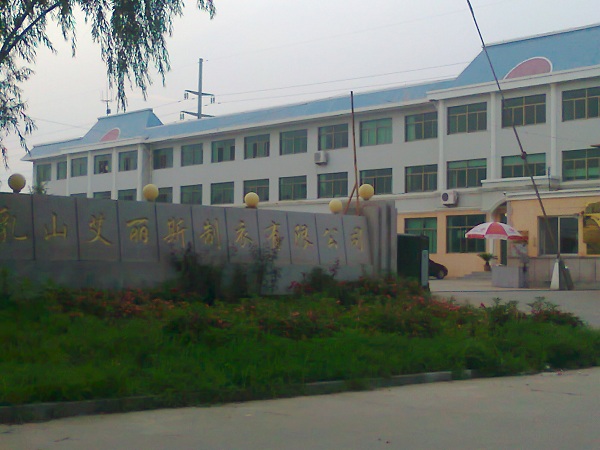
The front gate of Rushan Alice Garment Ltd
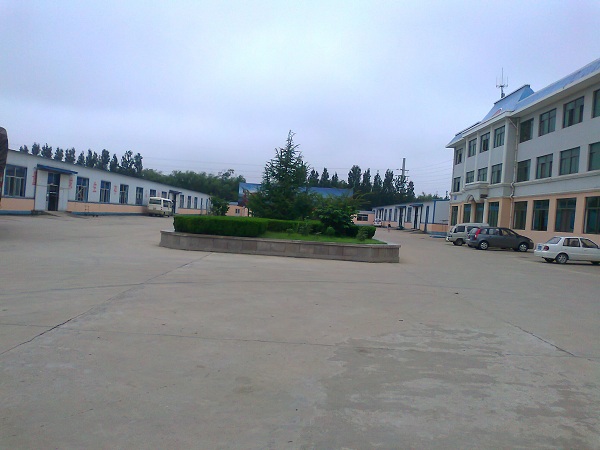
The factory environment
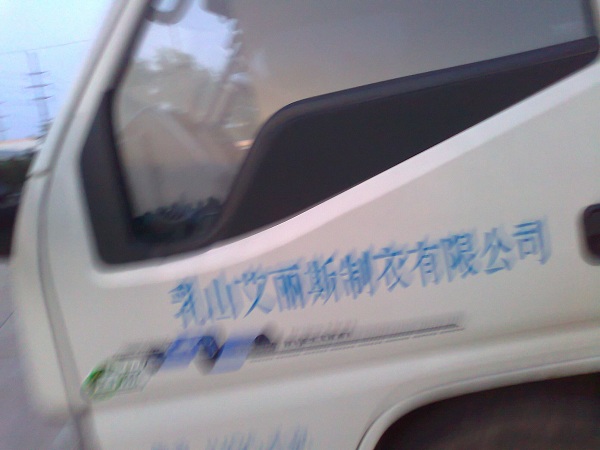
Rushan Alice Garment Co., Ltd. Truck
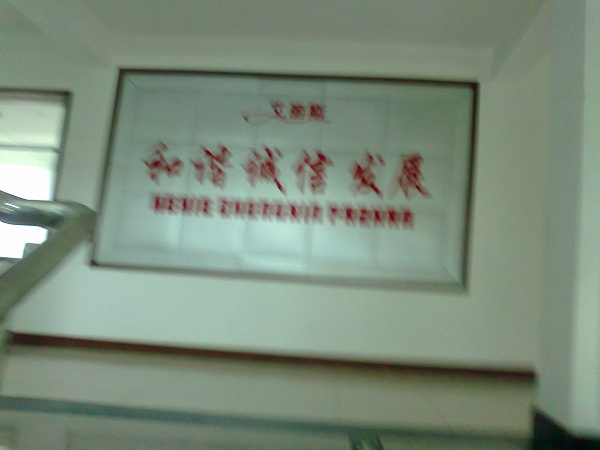
Rushan Alice: Harmony, Credibility and Development. This is the factory area where our investigator worked.
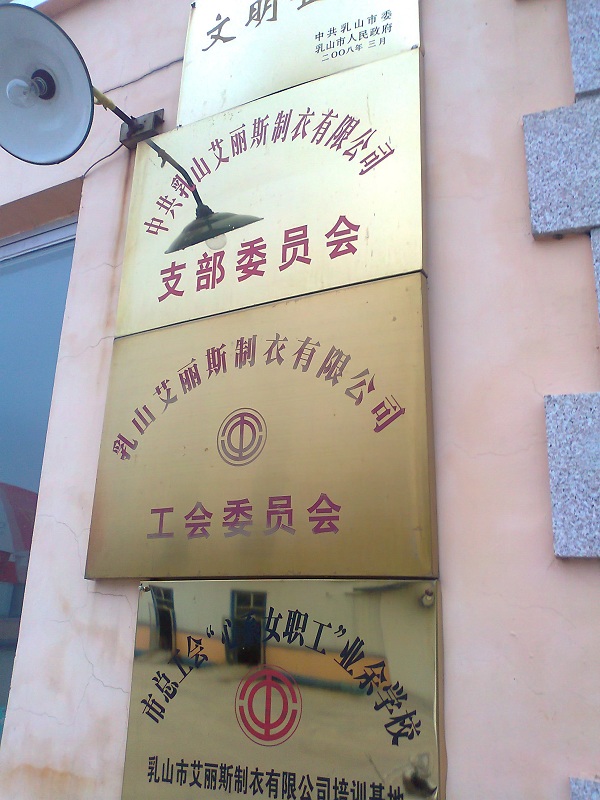
The office of Rushan Alice's Labor Union
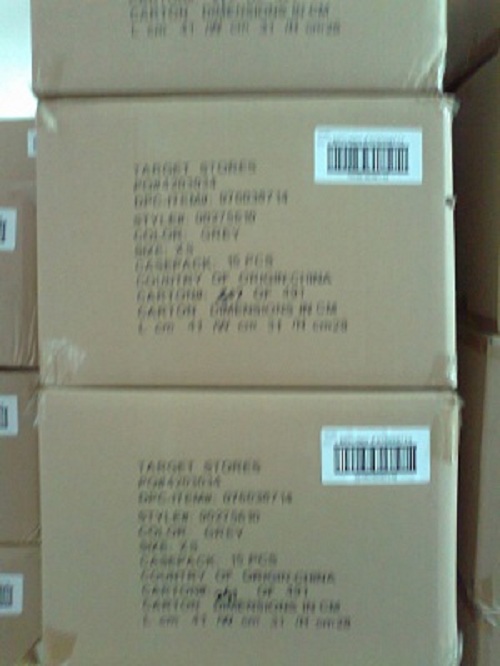
Target's shipping box. Our investigator saw the products he personally produced and the outsourced products put in these boxes.

Rushan Alice Garments Company Limited
Outside Processing Plant Contract
Delivery Dates:
August 10 – August 15
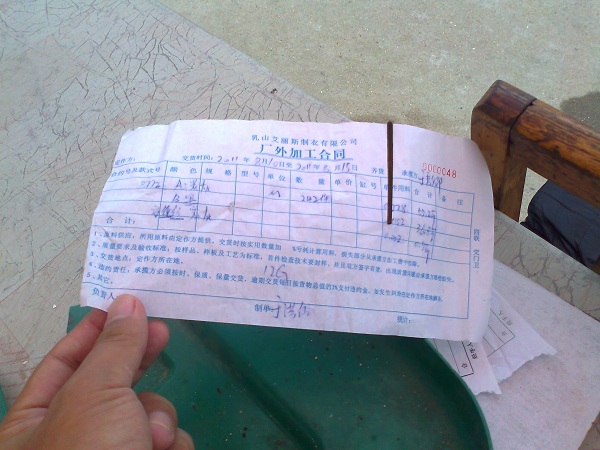
Rushan Alice Garments Company Limited Outside Processing Plant Contract
Notes
[1] Target denied that we investigated this factory. They contended that we investigated another company, Aolidan, which is in the same compound as Rushan Alice. However, the Baidu map shows that the two companies are two blocks away and all the photos taken outside and inside the factory show that the factory is Rushan Alice rather than Aolidan.
[2] Rushan Alice calculates worker's salary by piece rate rather than hourly rate. The piece wage remains the same no matter the worker work overtime or in general hours. This is a tricky violation of the Chinese labor law. Chinese labor law regulates that worker should be paid 1.5 times in their general overtime, 2 times during the weekend and 3 times during the statutory holidays. This is what we refer to as workers are underpaid in our report.